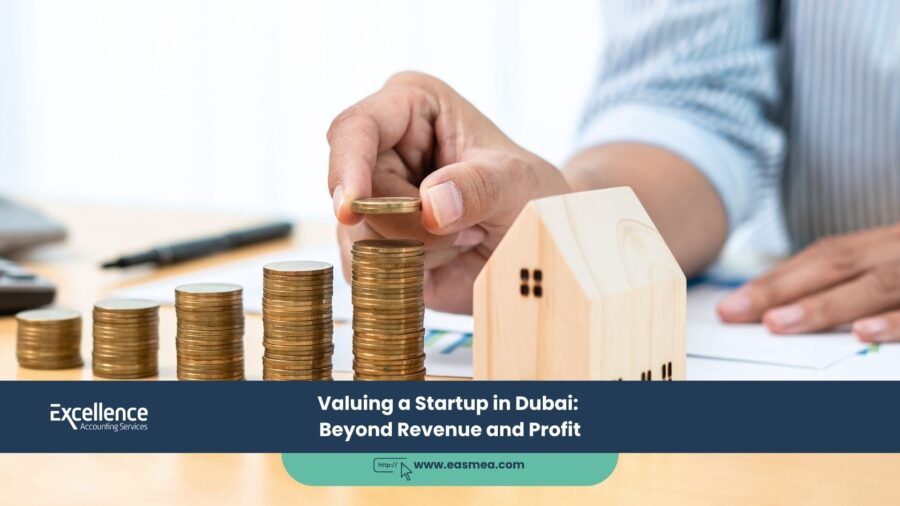Valuing a Startup in Dubai: Beyond Revenue and Profit
How much is your startup worth? For an established business, the answer often lies in financial statements—in revenue multiples and discounted cash flows. But for a pre-revenue or early-stage startup in Dubai’s dynamic ecosystem, the traditional playbook doesn’t apply. When there’s little to no revenue and profit is a distant dream, how do you place a credible value on your vision? This is one of the most challenging and critical questions a founder will face when preparing to raise capital.
Investors in the region are sophisticated; they know that the value of a startup is not found on a balance sheet. It’s found in the potential of its idea, the strength of its team, the size of its market, and the defensibility of its technology. Valuing a startup is therefore less about accounting for the past and more about building a compelling, evidence-based narrative for the future. It’s about quantifying the intangible and justifying a valuation that can seem, from the outside, to be built on pure ambition.
This guide will demystify the art and science of valuing an early-stage startup in Dubai. We will move beyond traditional financial metrics to explore the qualitative factors that truly drive a startup’s worth in the eyes of an investor. We will also break down the common valuation methodologies used for pre-revenue companies, providing you with a framework to confidently answer that all-important question: “What’s your valuation?”
Key Takeaways
- Intangibles Drive Value: For early-stage startups, valuation is driven by factors like team strength, market size, technology, and traction, not just financial performance.
- The Team is a Key Asset: Investors are betting on the founding team’s ability to execute. A strong, experienced team can significantly increase valuation.
- Market Size Matters: A large and growing Total Addressable Market (TAM) is essential to justify a venture-scale valuation.
- Traction is More Than Revenue: Early traction can be demonstrated through user growth, engagement metrics, letters of intent (LOIs), and strategic partnerships.
- Valuation is a Negotiation: There is no single “correct” number. The final valuation is a negotiated outcome based on a compelling, data-backed story.
- Professional Guidance is Crucial: A Fractional CFO or advisor can help you build a defensible valuation narrative and financial model.
The Core Drivers of a Startup’s Valuation
Before looking at specific methods, it’s essential to understand the qualitative factors that investors scrutinize. Your valuation story must be built upon these pillars.
1. The Strength and Experience of the Founding Team
At the earliest stages, investors are not just investing in an idea; they are investing in the people who will bring it to life. A stellar team can command a higher valuation.
- Relevant Experience: Do the founders have deep domain expertise in the industry they are trying to disrupt?
- Track Record: Have any of the founders successfully built and exited a startup before? A “serial entrepreneur” with a positive track record is a massive asset.
- Completeness of the Team: Does the team have a balanced skill set covering technology, sales, marketing, and operations?
2. Market Opportunity (TAM, SAM, SOM)
Venture capital investors are looking for businesses that can scale to become very large. Therefore, the size of the market you are targeting is a fundamental driver of valuation.
- Total Addressable Market (TAM): The total market demand for a product or service.
- Serviceable Addressable Market (SAM): The segment of the TAM targeted by your products and services which is within your geographical reach.
- Serviceable Obtainable Market (SOM): The portion of SAM that you can realistically capture.
A startup targeting a multi-billion dollar market in the MENA region will justify a higher valuation than one targeting a small niche market.
3. Product, Technology, and Intellectual Property (IP)
What have you built, and how defensible is it? A unique technology or a strong brand can create a “moat” around your business.
- Proprietary Technology: Do you have a unique algorithm, a patent, or a trade secret that is difficult for competitors to replicate?
- Product-Market Fit: Do you have evidence that your product solves a real, painful problem for your target customers?
- Scalability: Can your technology handle 10x or 100x the number of users without a complete overhaul?
4. Customer Traction and Engagement
For a pre-revenue startup, traction is your proof of concept. It’s evidence that you are on the right track. Traction isn’t just revenue; it can be:
- User Growth: A rapidly growing base of active users.
- Engagement Metrics: High daily/monthly active users (DAU/MAU), low churn rates, and high time spent on the platform.
- Letters of Intent (LOIs) or Pilot Programs: Commitments from potential enterprise customers to use your product.
- Strategic Partnerships: Agreements with established companies that validate your business model.
A waitlist of 10,000 users for your app or a signed pilot project with a major Dubai-based corporation can be more valuable than a few thousand dirhams in early revenue.
Pre-Revenue Valuation Methods
Once you have a strong story around the qualitative factors, you can use several methods to arrive at a quantifiable valuation range.
1. The Berkus Method
Developed by angel investor Dave Berkus, this simple method assigns a value to five key risk factors, providing a baseline valuation. It’s ideal for pre-revenue startups.
| Risk Factor | Value (up to) | What Investors Look For |
|---|---|---|
| Sound Idea | AED 1M | A plausible idea that solves a real problem in a large market. |
| Prototype | AED 1M | A working prototype or MVP that demonstrates the core functionality. |
| Quality Management Team | AED 2M | A strong, experienced, and complete founding team. |
| Strategic Relationships | AED 1M | Key partnerships or a strong board of advisors. |
| Product Rollout / Sales | AED 1M | Early signs of traction or a clear go-to-market plan. |
Under this method, a startup could be valued at up to AED 5 million before it has generated a single dirham of revenue.
2. Scorecard Valuation Method (Checklist Method)
This is a more nuanced comparative method. It starts by finding the average valuation for similar pre-revenue startups in the region. Then, it adjusts this average based on how your startup scores on a set of key criteria, weighted by importance.
- Strength of the Management Team (30% weight)
- Size of the Opportunity (25% weight)
- Product/Technology (15% weight)
- Competitive Environment (10% weight)
- Marketing/Sales Channels (10% weight)
- Need for Additional Investment (10% weight)
Your startup is scored from 0-100% on each factor compared to the “average” startup. The weighted score is then used to adjust the average valuation up or down.
3. Cost-to-Duplicate Approach
This method asks: “How much would it cost for a competitor to build this business and its assets from scratch?” It involves calculating all the costs incurred to date, including salaries for developers, marketing expenses, and legal fees for setting up the company and protecting IP. While simple, this method often produces a low valuation as it ignores future potential and any intangible value created.
Build a Defensible Valuation with EAS
Valuing your startup is a critical step in the fundraising process. Getting it wrong can mean leaving money on the table or failing to secure a deal. At Excellence Accounting Services (EAS), our Fractional CFO and advisory services are designed to help you build a credible and compelling valuation narrative.
How We Help Startups:
- Startup Valuation Advisory: We help you analyze your strengths and use appropriate methodologies to arrive at a defensible valuation range for your investor discussions.
- Financial Modeling: We build sophisticated, assumption-driven financial models that project your path to profitability and form the quantitative backbone of your valuation story.
- Pitch Deck & Investor Prep: We help you refine the financial sections of your pitch deck and prepare you for the tough questions investors will ask about your numbers.
- Due Diligence Support: We ensure your financial house is in order, making the investor’s due diligence process smooth and successful.
Frequently Asked Questions (FAQs)
Pre-Money Valuation is the value of your startup *before* an investor puts in any cash. Post-Money Valuation is the pre-money valuation plus the amount of new investment. For example, if an investor agrees to invest AED 2 million for a 20% stake, the post-money valuation is AED 10 million (2M / 20%), and the pre-money valuation is AED 8 million (10M – 2M).
This is challenging as data on private deals is not always public. It requires research through industry reports, venture capital databases (like PitchBook or Magnitt for the MENA region), and networking with other founders, accelerators, and investors in the ecosystem. This is an area where an experienced advisor can provide significant value.
Yes, this is a form of the Market-Based Approach. However, you need to be careful. You must be able to justify why your startup is truly comparable. You should also be prepared to discuss differences in team, technology, and traction that might make your valuation higher or lower than the competitor’s.
This is a normal part of the negotiation. Be prepared to defend it. Walk them through your logic, the qualitative factors, and the methodology you used. Be confident but not arrogant. If they provide a strong counter-argument, be open to discussion. Sometimes, it’s better to accept a slightly lower valuation to get the right strategic investor on board.
Not necessarily. A very high valuation in an early round can set unrealistic expectations for your next funding round (this is known as the “valuation trap”). It can be more strategic to raise at a reasonable valuation from a top-tier investor who can provide significant value beyond just cash.
At the pure idea stage, the valuation is almost entirely based on the strength of the founding team and the size of the market opportunity. The Berkus Method is very useful here. The valuation will be on the lower end, as the technology and execution risks are at their highest.
It should be ambitious but realistic. Your model should show a “hockey stick” growth curve that is exciting to a VC, but every assumption behind that growth must be logical and defensible. Having a “base case,” “best case,” and “worst case” scenario can demonstrate sophisticated thinking.
Yes. It can make you seem inexperienced. While you can be flexible, you should go into investor conversations with a clear, well-reasoned valuation range in mind. Saying “we’re open” can be perceived as a lack of confidence or preparation.
The pitch deck is your primary tool for telling the story that supports your valuation. Each slide—from the problem and solution to the team and market size—is a building block in your valuation argument. A compelling, data-driven pitch deck is essential.
For an early-stage funding round, a formal, 50-page valuation report is usually not required. Investors are more interested in your thought process and the narrative. However, working with a valuation advisor or a Fractional CFO to build your model and justify your number is a very smart investment.
Conclusion: Crafting Your Valuation Story
Valuing a startup in Dubai is not a simple calculation; it’s the art of crafting a compelling and defensible narrative about the future. It requires you to look beyond the empty cells in your revenue spreadsheet and focus on the foundational pillars of your business: your team, your market, your technology, and your traction. By understanding these core drivers and using established methodologies to frame your argument, you can approach investor conversations not with uncertainty, but with the confidence of a founder who truly knows what their vision is worth.
What's Your Vision Worth?
Our expert CFO and advisory services help Dubai startups create defensible financial models and valuation strategies to succeed in their fundraising journey.




